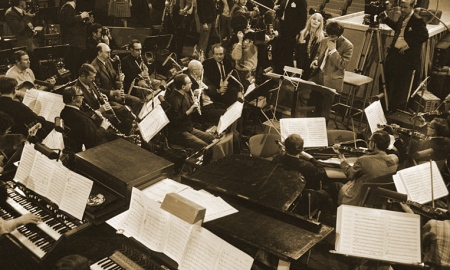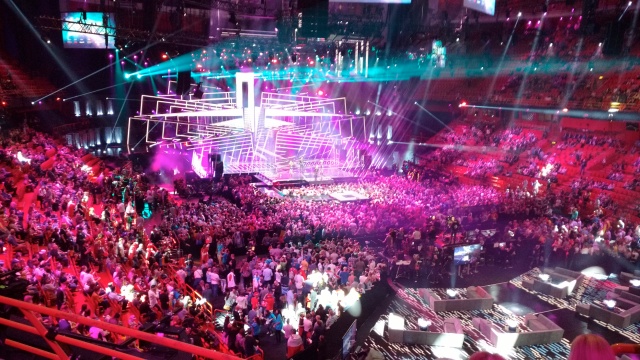May 14 2016, and Jamala wins the Eurovision Song Contest for Ukraine. National Broadcaster NTU knows that the Eurovision Song Contest circus will arrive on Sunday April 30th for rehearsals (and the stage crew need to start building up the venue around April 17th). That doesn’t leave a lot of time to plan for a major international event.
While circumstances mean that it has always been a race run successfully by other host countries, is there a better way?

Someone has to order and build the Ikea sofa beds in time for the EuroClub (Photo: Lina Åhman, SVT)
Why Does It Take So Long?
We know that Sweden – the model of musical and organisational efficiency – sorted out its Eurovision Song Contest hosting in Malmö and Stockholm with ridiculous speed. Stepping away from a country that organises six of these events each year through Melodifestivalen and you’ll see that waiting until the fourth calendar quarter to confirm all of the details is not unusual. In 2014 Denmark took till September to confirm Copenhagen, Germany 2011 took till October to announce Dusseldorf as the selected location. And even though everyone knew that Baku would host in 2012, Azerbaijan held off until January before making it official (although the Crystal Arena construction had broken ground in late August).
It’s not as simple as going ‘City… Stadium… Announce…’ The logistics behind the Eurovision Song Contest makes it one of the most stressful experiences for an event organiser. Even though the Reference Group is on hand with the experience of overseeing previous Contests, each Eurovision edition is a unique proposition.
When the credits start rolling in May the clock starts ticking and the new host broadcaster is up against a ridiculous schedule.
Assessing the necessary details to meet the EBU documentation expectations, securing the required finances, allowing for the proper investigation and inspection of venues all takes time, particularly when many venues are not regularly utilised in the way that Eurovision requires. Every year is a hard and fast education process. And unless it’s a case of fait accompli for a Song Contest winner (and it never is), few countries will have this information easily to hand once the EBU come calling the day after winning.
As we’ve seen this year with Ukraine, the interlocking pieces of the hosting puzzle take time to sort out. The bids from all the potential hosting cities across Ukraine had their own differing weaknesses; from passenger capacity at airports to physical accommodation, availability of venues and issues relating to ensuring safety of attendees. Although the final selection of Kyiv seems ‘obvious’ to those outside of the process, this was not a rubber stamping selection process. Not one bid was perfect, but NTU has chosen the bid that it believes makes the most sense
I’ve no doubt that with time the issues contained in every bid could be addressed but time is a resource the eleven month turnaround to the next Contest does not offer.
Perhaps it should.
Tradition Must Be Seen To Be Maintained
But first, a vital detour.
The modern Eurovision Song Contest has a number of touchstones that many consider sacrosanct – the Winner’s duty to host the next Song Contest is one of them. But these signatures should never be left alone just because things have always been done that way.
Since its introduction in 1975, the awarding of douze points as the top score has been one of the most vocally identifiable moments of the Song Contest. To the casual viewer that tradition carried on in Stockholm 2016, but a closer examination shows that each country could award a top score of twenty-four points – twelve from the public vote and twelve from the jury. Because the public votes were amalgamated by the country receiving the points, only the douze from the juries were read out. Tradition was maintained, but a new scoring presentation system (and the effective doubling of the final score) was achieved.
The Eurovision Song Contest can honour tradition and move with the times, and it is with that attitude that the matter of hosting should be discussed.

The Metropole Orchestra, 1970
What’s Another Year?
Other major televised events on the calendar such as the Olympics and World Cup take years to decide on host cities. There is a thorough bidding process, and the winners are given a number of years to actually put those proposals into actual place. Don’t have a roof on your stadium? You’ve got eight years to secure the funding and complete construction to required standards.
Eurovision is not afforded such a luxury. Unless you are a modern city with everything already in place in terms of infrastructure, of course this will be a struggle. With the requirement of a covered venue that has a minimum capacity of 10,000 people, access to modern media facilities for 1500 journalists, some 4,000 available beds for delegations and visiting fans, an international airport with the excess capacity to accommodate the circus… These requirements alone effectively rule out a large swathe of cities and countries, and that’s even before you start talking finances and broadcast quality expectations.
So what do you do? Do you only allow countries that can meet those specifications at the time of performance to enter? Goodbye most of Southern and Eastern Europe. Do you go to a pure bidding process? What would be the incentive to enter your country in such a Contest then?

The ESC 2016 Press Bunker. Photo: Kylie Wilson
As we’ve already established, the principle of having the winning country host the Contest should be retained. It offers a tangible target for every host broadcaster, it creates a sense of earned victory, and the benefits to a hosting country can outweigh any (reasonable) cost of putting up with Eurovision.
When you take an honest look at the Contest, those that will benefit most from the potential tourist numbers and exposure Eurovision offers are those smaller countries and cities – ones who will never be in a position to host the Olympics for instance, or gain the same level of positive media attention that a Eurovision win brings.
That’s why Kyiv and Odessa were continuing to push themselves as the ‘obvious’ choice to host the 2017 Song Contest. The city would be promoted around the world, the victor would become associated with music and competition and togetherness. As Malmö has shown, Eurovision can be used to reinvigorate a town and rebrand it as fresh and musically exciting, no matter the past history. The Contest brings a level of tourism-based PR that cannot be bought.
To be fair, Ukraine as a whole will benefit from the marketing push, but much like the potential for revitalising a city that hosts the Olympics, the opportunity to accelerate infrastructure projects, civic constructions, and better transport links can be pushed through if the Contest is going to be coming.
The issue is not the cost, or the hunger. The issue is time. As the Song Contest evolves into a marquee event, as it takes up more time in the host city than three hours on Saturday, as the live shows increase in complexity, something has to give.
It’s time for a winning country to be given an extra year before hosting the Eurovision Song Contest.
Then You Gotta Slow It Down
If this idea was in place for the 62nd Contest, whoever wins in 2017 would pick up the traditional hosting rights, but for 2019. That offers the organising team an extra twelve months to organise the Song Contest. That leaves more time for bids to be put together, for infrastructure to be put in place, for venues to be found, for arrangements to be made, for construction to begin, for stage designs to be considered. In fact all of the stuff that is done now would still be done, but under a sense of haste rather than a sense of panic.

Junior Eurovision lights up the world (image: EBU)
The question of hosting in the first (and only) gap year is more a diplomatic problem – either a Contest needs to go out to tender, or the EBU comes to an arrangement with a suitable host broadcaster. I suspect that one solution to this already exists. Assuming that there were plans on the shelf in case of an Australian victory, these could be dusted off and given the nod to host the 2018 Contest… and given the nod now so it has more than year to get ready.
Yes there will be issues in the TV presentation, the winning song from two years ago would be the lead in, and it might look a touch awkward, but like the change in voting, the move to public votes, or even the removal of the orchestra, the Song Contest can adapt. But giving an extra year to sort out hosting maintains a Song Contest tradition, it acknowledges a multitude of practical concerns both for the host city and the delegations. Each Eurovision would be able to announce the next host city with one hundred percent certainty, there would be no tentative dates and scheduling around other major events would be easier. Whenever you have certainty over a longer period, budgets can be reduced for travel and accommodation, and the commercial team would have the ability to sell multi-year sponsor deals with far more confidence.
Would the mainstream audience at home notice the twelve month delay? Yes, the Eurovision community has an intimate knowledge of the location and venue, but when one of the most popular questions in April is “where is it this year anyway?”, I think that the viewing public are smart enough to realise the need for organising such a mammoth event.

Globen, on Semi Final 2 night. Not planned in a day (image: Ellie Chalkley)
Final Thoughts
Organising the hosting of the Eurovision Song Contest is not something that is on detailed view to the Eurovision community. NTU’s lengthy public discussions on hosting the 2017 Song Contest might have looked chaotic and never-ending, but tit shone a light on an issue rarely explored. There’s no doubt that one year is just enough time to organise a Contest, but could it be a better Contest if you had two years to get everything ready?










Interesting article – I would have to say that major sporting events like the Olympics need more time, due to the need to build multiple venues for different sports as a minimum requirement, something that a ‘one venue’ event like Eurovision doesn’t need to the same extent.
Having said that, the way that the Contest is expanding each year should at least have every entrant broadcaster thinking “what if we win”? Major nations like the UK, Germany and Sweden would find it relatively straightforward to stage Eurovision now in several venues in their respective nations, whereas some smaller nations with money to spend (Azerbaijan being a case in point) have just the one option (normally their capital), which makes the final decision easier after winning the Contest. The problem may arise if we have a ‘shock winner’ – someone from a small poorer nation that would have to rely heavily on the State to subsidise the hosting of Eurovision (what if Moldova or even San Marino won?).
As for time, I think that any broadcaster and government that isn’t thinking about where they will be hosting the moment their artist wins is likely to fail. Ukraine showed future hosts that if you are going to have a bidding process, it is probably best to have something planned to go ahead ASAP after the end of the Contest – I think it also shows that Jamala winning was a big surprise to them as much as to a lot of Eurovision fans…
I’m sure your suggestion could work though and after a few cycles most fans will wonder why we ever stuck with the winner hosting the year after! Would it make a better Contest though? I’m not sure that it necessarily would as far as the spectacle is concerned – I suspect that the old adage of effort going to infinity as time approaches zero would tend to hold true if you had 12 or 24 months to set Eurovision up and the end result would be the same.
The way I see it, if Azerbaijan can build an arena from scratch in less than a year, then a year is enough. Ok, that’s an extreme example, but most countries have the venues and infrastructure all ready to go. Even a tiny country like Malta – which doesn’t currently have a permanent venue suitable for ESC – would find a way, like they did for JESC 2014.
If a country is having trouble organising, the EBU should step in and help out. In situations like this, more time is not the answer if the expertise and skills aren’t there in the first place.
Organising 6 broadcast quality events delivered in a week isn’t anywhere near as complex as an equivalent number of sport events. Any nation that can’t organise a Eurovision with 8 or more months probably won’t do much better with an extra year.
the problem is not the host nation having no time to prepear for a year. the problem i think is how big eurovision (especially the venue) is made. having to find building big enough for fans to wave thier flag for a show that you can essencially do in a studio is ludicrious. i suggest either the EBU tones down the arena hunting and make a theater or studio venue the minimum of the what a host brodcaster would do. or find an open field and do eurovision there ala glastonbury.
And if it was just the Big OB I’d agree with you.
and than there is the issue of the the winning country.
Do they compete directly in the final at the year after their win or when they host or on both years?
I am sure there are more issues that need to be addressed so it’s not only a question of time.
Is this actually a genuine issue? Or is it just based on Ukraine having some problems this year? (And remember, Ukraine still had problems the last time they hosted, back when ESC was a lot simpler…)